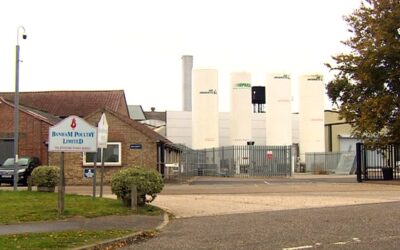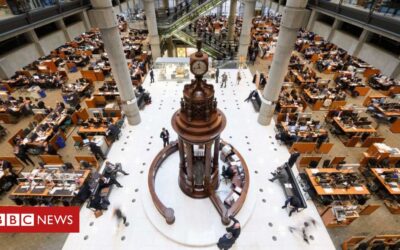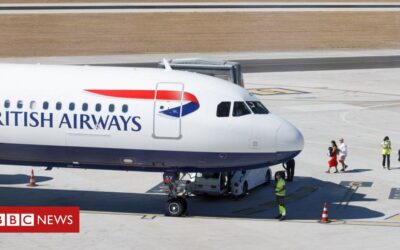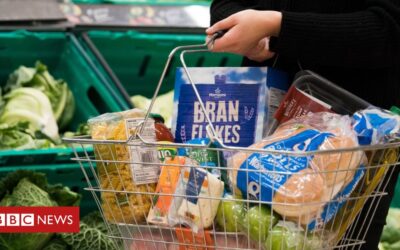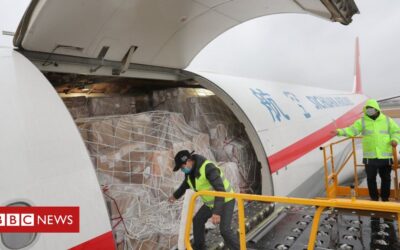image copyrightManna AeroA Tesco drone delivery trial will see small items dropped off at customers’ homes within 30 minutes of ordering.Based at Tesco’s Oranmore store, County Galway, the drones will deliver “small baskets” of goods to the local area.The drones, supplied by Manna, which already runs medicine delivery trials in Ireland, will launch next month.Flying at 50mph (80km/h), they can deliver up to 4kg (9lb) of shopping – in a cargo cassette lowered from the drone – a mile away in three minutes.Manna had planned a takeaway food delivery trial in March but changed its focus to medicines during the coronavirus pandemic.It now delivers prescriptions and other essential supplies in the town of Moneygall.Noise concernsIn 2016, retail giant Amazon made its first commercial drone delivery in the UK – from its fulfilment centre in Cambridge to a local resident, within 13 minutes of the order being placed.And in April 2020, the UK government announced much larger unmanned aerial vehicles (UAVs) would deliver essential hospital supplies from the mainland to the Isle of Wight.But some drone trials have been opposed by residents who say the aircraft are too noisy and intrusive.And, last year, an Institution of Mechanical Engineers report indicated only a quarter of UK adults supported the idea of drone deliveries, because of safety and noise concerns.Related TopicsTescoDronesRepublic of IrelandMore on this story
BBC Business News Articles
Coronavirus: Banham Poultry workers 'turned up for work sick'
By Matt PreceyBBC NewsRelated TopicsCoronavirus pandemicWorkers at a chicken factory at the centre of a Covid-19 outbreak say colleagues turned up for work despite being unwell during the pandemic.Banham Poultry in Norfolk closed last month and more than 100 staff have since tested positive for the virus.One worker told the BBC “people were afraid to take sick leave, because sick pay is so low”.The company said employee safety “has always been and remains our number one priority”.The number of cases at the plant in Attleborough has increased to 127, with a further 22 linked to the outbreak.Public health officials told a recent cabinet meeting of Norfolk County Council that Banham Poultry had followed government guidance.But three workers who spoke to the BBC on condition of anonymity described how colleagues presenting with symptoms had previously turned up for work.They said their co-workers had done this because they would “struggle” to get by on sick pay.image copyrightAFPTwo also described how colleagues, including one woman who appeared to have Covid-19 symptoms, had gone into work soon after returning from abroad,One said: “We had people coming back from holiday, who should be in quarantine, but they weren’t. I am surprised we didn’t get Covid sooner.” The staff also said shift changes led to situations where social distancing was difficult, and highlighted the smoking area as a particular problem.’Poor pay’The company previously confirmed it provided workers who were self-isolating with statutory sick pay, currently set at £95.85 per week.Miles Hubbard, regional officer of the Unite union, said: “Unite has warned food processing employers that poor pay combined with a lack of company sick pay risks staff having to choose between self-isolating or hoping for the best and going into work because they cannot afford to be ill.”Refusing to provide adequate sick pay is unjust in any circumstances, but particularly so during a pandemic.”Banham Poultry went into administration in 2018 with debts of £40m.It was bought by Chesterfield Poultry, which made pre-tax profits of £2.5m in 2018/19.In a statement, Banham Poultry said testing had found 95% of its cases had been asymptomatic.”To ensure the risk of coronavirus spreading on our site has been minimised. We have had social distancing measures in place from the outset, including introducing separation screens where that is not possible,” it said.”Those that have left the country to visit places not approved by the government’s travel corridor list have been expected to self-isolate for 14 days. “We have a return to work declaration that requires staff to record where they have been. We can only control what happens at our site.”In the Commons on Thursday, Mid Norfolk Conservative MP George Freeman asked what financial support was available for the firm.Environment Secretary George Eustice replied: “I had a meeting with my officials yesterday to discuss this individual case.”We do understand the difficulties that Banham Poultry are facing. I know that our officials are in constant dialogue both with the company but also with officials in other departments including Public Health England and the Treasury as well.”Find BBC News: East of England on Facebook, Instagram and Twitter. If you have a story suggestion email [email protected] TopicsMore on this story
Sister Bliss of Faithless: Nightclubs and DJs 'left in the corner to rot'
Sister Bliss from dance act Faithless has said UK nightclubs have been “left to rot in a corner” amid the pandemic.The government says clubs must stay shut “in line with current scientific advice to control the virus”.The musician and DJ told BBC Radio 6 Music club culture should be better protected.”There’s a lack of leadership at the top which means certain industries have been given support and then others have been completely ignored,” she said.”The electronic music scene and clubbing is definitely an incredible part of our cultural and economic force, and it travels all over the world globally.”We really, I think, have been left to rot in a corner, so it’s good to see that venues and artists are trying to galvanise it – with the Let the Music Play movement – trying to bring the plight of venues and freelancers, like myself, to the fore.”Indie stars discuss music careers in the time of Covid
Stars back plea to support UK live music industry
The Let the Music Play campaign saw 1,500 artists sign an open letter in July calling for support for the UK’s music scene.”All we can do is keep waving a flag and saying, ‘We want support as well,'” she told 6 Music’s Georgie Rogers.The government has announced a £1.57bn Culture Recovery Fund, but there is uncertainty over how far this money will stretch and where it will go.Sister Bliss’s comments come on 6 Music’s State of the Independents Day on Thursday, looking into the effects of the pandemic on the independent music sector.In response, a government spokeswoman said: “We know this is an incredibly difficult time for nightclubs, but they will need to remain closed for now in line with current scientific advice to control the virus.”We continue to engage with industry representative and listen to their concerns.”Throughout the pandemic, nightclubs have access to the government’s unprecedented package of support to help businesses, which includes business rates relief, tax deferrals, the Coronavirus Job Retention Scheme and billions paid in loans and grants.”While clubbing as we know it remains off the cards, some venues have been able to diversify in a bid to stay open and survive.Venues like Brixton Jamm and Escape to Freight Island in Manchester have been able to move things outside and host seated, socially distanced events with strict rules.Meanwhile, virtual clubbing has boomed, with DJs moving their sets online via social media or platforms like Boiler Room and United We Stream.’On a cliff edge’Last week, the Night Time Industries Association (NTIA) lent its support to The Global Nighttime Recovery Plan, which is looking at the “the future of dancefloor” by proposing flexible and open clubbing experiences.NTIA boss Michael Kill told BBC News the night time economy was “on a cliff edge”, with furlough coming to an end soon. A government scheme meaning no business can be evicted for missing rent payments is also ending this month.At the end of July, a survey of the association’s members suggested that 58% fear they will not survive longer than two months without further government support. And 71% were already set to make more than half of their workforces redundant in a matter of weeks.”We need the government to recognise the critical position the sector is in across the UK and work expediently to release a roadmap,” Mr Kill said. “But also act quickly to put a sector specific financial package together which will allow these businesses to survive and save jobs.”DJ Jamz Supernova told 6 Music club culture has been undervalued in the UK for a long time.”Nobody flies across the world to go to a restaurant,” she declared. “You will fly across the world if there’s a great clubbing scene.”So I felt there needs to be a lot of more transparency, communication, and funding.”Follow us on Facebook, or on Twitter @BBCNewsEnts. If you have a story suggestion email [email protected].
Coronavirus: Lloyd's of London expects to pay out £5bn in claims
Insurance market Lloyd’s of London has said it expects to pay out up to £5bn for coronavirus-related claims.Its chief executive John Neal said the first half of the year had been “exceptionally challenging”.Insurers around the world have paid out on event cancellation, travel, trade credit and business interruption policies due to the virus.However, there are court cases continuing to try to get some insurers to pay out for Covid-related losses.The Lloyd’s of London insurance market, whose results are an aggregate of its more than 90 syndicate members, said it would pay out £2.4bn in pandemic-related claims in the first half, after reinsurance recoveries.It reported a half-year loss of £400m compared with a £2.3bn profit in the first half of 2019.While coronavirus-related payouts could be up to £5bn, Lloyd’s reinsurance covers £2bn of that amount.But losses due to the pandemic could stretch into future years, chairman Bruce Carnegie-Brown said. “Nobody knows when it started, we certainly don’t know when it’s going to end.”‘Catastrophic damage’Chief executive John Neal said: “The first half of 2020 has been an exceptionally challenging period for our people, our customers, and for economies around the world.”The pandemic has inflicted catastrophic societal and economic damage calling for unparalleled measures to stifle the spread of the virus, and to get businesses and economies back on their feet.”Insurers around the world have been hit by the cost of the coronavirus pandemic, although many businesses that have tried to claim have found the virus is not covered by their policies.In July, the Financial Conduct Authority (FCA) brought a UK case to try to bring clarity as to whether business interruption policies cover Covid-19.Coronavirus: ‘We’ve spent £10,000 on invalid insurance’
Coronavirus: Lloyd’s of London says claims to be biggest since 9/11
Mr Neal conceded on the BBC’s Today programme that £5bn was not that big a payout considering the scale of the pandemic.”It’s a real issue, isn’t it, when you look at systemic and complex risk, whether it’s business interruption, or cyber, or climate,” he said.”And that’s why we’ve been very engaged with government to say: ‘Look, [this is] what can we do as an industry, and what can you do, to ensure that businesses and people are better protected when these events come along’.”Mr Neal said the court judgement on the FCA case was due next Tuesday, and that would be “good for customers, and good for the industry, so everyone knows exactly where they stand as to what is covered and what isn’t covered”.He said that while there were also court cases in the US to try to determine whether businesses are covered for the pandemic, the risks to insurers of an unfavourable ruling is “in the hundreds of millions, not the billions”.He added: “The reality is, and it’s unfortunate, the vast majority of policies do not provide cover for this type of loss, and we’re as bothered by that as anything, to try and make sure that next time around, whatever the event, customers have had the opportunity to buy the right products and services.”Impact on premiums?Industry body the Association of British Insurers (ABI) said that Covid-19 had been “an unprecedented event”, not just for the UK insurance market, but for everyone in the UK.”Global pandemics are by their nature very rare, unlike for natural disasters like bad weather, such as storms and floods, which are usually insured against,” an ABI spokesman said.He said that while many businesses will not have taken out policies that cover Covid-19, the trade body still expects the UK insurance industry to pay out more than £900m for coronavirus-related claims, and £275m to travellers forced to cancel travel plans.It is unclear whether or not this would feed through to consumers having to pay higher premiums across the board.”The UK insurance market remains a competitive one, with individual insurers setting their premiums to reflect their own exposure and level of claims paid. These will naturally vary between individual providers,” he said.
British Airways owner IAG to cut more flights
British Airways owner IAG is cutting more flights over the next three months as it adjusts to the continuing collapse in demand for air travel.IAG, which also runs Aer Lingus and Iberia, said quarantine restrictions meant capacity this autumn would be 60% below 2019 levels.The group said it had seen a “delayed recovery”, and did not expect business to return to 2019 levels until 2023.IAG also said BA had reached the outline of a jobs agreement with Unite.The union has been in a bitter dispute with BA over redundancies and pay cuts for cabin crew. BA has already reached a separate deal with pilots.The airline, which is aiming to shed up to 13,000 jobs, said that by the end of August some 8,236 employees had left the business, “mostly as a result of voluntary redundancy”.Unite stressed its cabin crew members still needed to approve the plan through a ballot and that negotiations remained ongoing. “Unless and until Unite members agree to all and any proposals, no settlement has been reached and it is unhelpful and misleading for British Airways to suggest otherwise,” said assistant general secretary Howard Beckett. Bookings slowIAG’s decision to cut more flights than planned follows its previous forecast of a 46% reduction for the October-to-December period compared with the same quarter last year.Virgin Atlantic to cut 1,150 more jobs
Gatwick Airport plans 600 jobs cuts
It said it had seen an “almost complete cessation of new booking activity” in April and May due to the pandemic, but the easing of country lockdowns boosted ticket sales in June.However, since July there had been an “overall levelling off in bookings” as the UK and other European countries re-imposed quarantine requirements for travellers returning from countries such as Spain.On Tuesday, EasyJet revealed it will have flown “slightly less” than the 40% of pre-coronavirus pandemic capacity it previously said it would operate between July and September following the government’s decision to impose quarantine restrictions for seven Greek islands.Boris Johnson appealAirlines are among the firms hardest hit by the impact of the pandemic. British Airways plans to cut up to 13,000 jobs due to the crisis, while EasyJet and Virgin Atlantic are slashing 4,500 roles each.Operators say the UK’s travel quarantine policy – which requires visitors to high risk countries to isolate on their return – is crushing demand and want the government to back testing at airports instead. UK government sources have indicated that they are looking at system where the two tests would be eight days apart to further minimise the risk of “false negative” results.They are yet to approve the idea, however, while the prime minister last week warned testing at airports could give a “false sense of security”. In a joint letter to Prime Minister Boris Johnson on Thursday, Airlines UK, whose members include BA, Virgin, Ryanair and EasyJet, called for an extensions of the jobs furlough scheme and air passenger duty waiver.”Our industry is in crisis,” the letter said. “In sum, we ask you to act urgently to implement a programme of recovery for our sector.”Raising moneyIAG also announced on Thursday that it was tapping shareholders for €2.7bn (£2.5bn) to help shore up its finances.The company said the money would be used to reduce debt and help it withstand a prolonged downturn in travel.Under the fundraising, existing investors will buy new shares at a deeply discounted price – 36% below the closing price on Wednesday. The group’s largest shareholder, Qatar Airways, which has a 25.1% holding, has said it will buy its full entitlement. Details of the rights issue, which was announced in July, come two days after new chief executive Luis Gallego took over from long-time boss Willie Walsh.
Coronavirus: Young people and home workers scapegoated, says TUC boss
The government must stop “scapegoating” young people and home workers for its own failings in handling coronavirus, the leader of the TUC has said.Frances O’Grady said ministers had been wrong to criticise the public for misconstruing “contradictory” advice.She also praised Labour leader Sir Keir Starmer for a “strong start” but warned the party had a “mountain to climb”.Boris Johnson said on Wednesday that rules on behaviour during the pandemic had become “complicated and confusing”.Announcing a ban on gatherings of more than six people in England from next week, the prime minister added that the government was “simplifying and strengthening” its guidelines.The TUC’s annual congress – held mostly online this year because of coronavirus – starts next Monday.It comes as the number of people in work is falling and ahead of an autumn in which businesses are expected to lay off tens of thousands more staff.In an interview with the BBC, Ms O’Grady implored Chancellor Rishi Sunak to extend the furlough scheme beyond October.”We’re at the crossroads,” she said. “All depends on the decisions that the government takes now. We don’t want to see a tsunami of job losses.”If we ended up repeating the mistakes of the 1980s and whole towns go down, that’s a real problem.”Starmer’s startLabour, the unions’ traditional political ally, is smarting from its worst defeat, in terms of parliamentary seats, since 1935.To regain power, Ms O’Grady said, leader Sir Keir Starmer must harness the “collectivist” spirit shown during the pandemic, in volunteering and the weekly applause for key workers.”Keir has had a really strong start,” she said. “You only have to look at the opinion polls to see that.”I hear Keir talking about decency, dignity. Those are really important values, along with people looking after each other.”The comments come at a time of strained relations between the Labour leadership and Unite, the second biggest UK union.Leader Len McCluskey, a prominent backer of Sir Keir’s more left-wing predecessor Jeremy Corbyn, has promised a review of its donations to the party.Asked whether this signified a potential schism between different political wings of Labour-backing trade unionists, Ms O’Grady said “soul-searching” was needed after such a disappointing election.But this must be followed “by a coming together and shared understanding” of how the party, out of Downing Street from more than a decade already, can win again.She added: “People from all parts of Labour’s spectrum recognise this is a high mountain to climb.”‘Moral injustice’With millions on furlough or working from home, Ms O’Grady said, the coronavirus crisis had created a “new working class suddenly, who have been working right through this crisis, often in jobs more exposed to the virus, from refuse collectors to social care workers”.In the last week, it has been reported that the living wage rise from £8.72 to £9.21 planned for next April will be scrapped when the chancellor delivers his Budget this autumn.Ms O’Grady claimed this would be “a moral injustice”.The government is asking employees in England to return to their usual workplaces if this is deemed safe.Meanwhile, coronavirus cases are rising, with Health Secretary Matt Hancock telling young people – whose rate of infection is higher than that of the rest of the population – to follow social distancing rules more carefully, saying: “Don’t kill your gran by catching coronavirus and then passing it on.”But Ms O’Grady accused ministers of giving “confused and sometimes contradictory” advice since the beginning of lockdown. “It doesn’t seem to be joined up,” she said. “What people resent is politicians and government scapegoating parts of the population when some would say they haven’t been top-class in terms of their own competence and capability.”More home working should be allowed, Ms O’Grady said, despite government warnings that this will do further damage to city-centre businesses, deprived of trade from commuters.Unions felt “frustration”, after reaching agreements on the issue with employers and then having “the rug pulled from under them” by “pronouncements made from on high” by ministers, she added.’Fallen short’Because of coronavirus, this year’s TUC congress, the traditional opening to the autumn conference season, is taking place at Congress House in central London, on 14 and 15 September, with the audience watching online.It follows a damning report into “institutional sexism” in the GMB, the UK’s third-largest union, in which bullying, misogyny, cronyism and sexual harassment were described as “endemic”.”I’m massively sad, disappointed and frankly angry that women are still experiencing this now,” Ms O’Grady said, “and that we have fallen short of our values.”She added: “It’s painful, but the GMB was right to commission the report. And it will be right to make sure those recommendations are implemented and acted upon.”Downing Street has been asked for a reaction to Ms O’Grady’s comments.The prime minister has insisted that maintaining furlough after 31 October would keep the economy in “suspended animation”, while civil servants have been urged to return to the office as much as possible.
Morrisons sales rise but profits hit by Covid costs
Sales at Morrisons surged in the first half of its financial year but the supermarket saw profits drop because of coronavirus-related costs.Morrisons said like-for-like sales, excluding fuel, rose by 8.7% in the six months to the beginning of August.However, pre-tax profit fell by a quarter after its costs rose by £155m to deal with the pandemic, including temporary workers and staff bonuses.It also said poor fuel sales hit income as more people worked from home.However, Morrisons said the extra costs had been partly offset by four months of business rates relief of £93m,In March, all UK retailers were given a one-year business rates holiday as the country entered lockdown. The decision prompted criticism because supermarkets have seen sales grow strongly during the pandemic.
Yum China's HK listing is the latest 'homecoming'
Yum China, which runs KFC and Pizza Hut restaurants, listed its shares on the Hong Kong stock exchange on Thursday amid growing tensions with the US.The fast good giant is also listed in the US where Chinese companies are coming under increased scrutiny.It is the latest so-called homecoming as China-based firms shift their focus back onto local markets.Yum China runs around 10,000 restaurants across mainland China in more than 1,400 cities and towns.The company’s share price dropped more than 6% on its stock market debut, although it has raised about $2.2bn (£1.7bn) from the share listing. The move by Yum China, which has traded on the New York Stock Exchange since 2016, comes against a backdrop of tensions between Washington and Beijing. The Trump administration has laid out plans for Chinese companies listed on the New York Stock Exchange and tech-focused Nasdaq to provide American regulators with access to their audit reports.Those that don’t could be forced to delist and exit US markets.Other “homecoming” listings in Hong Kong this year include internet groups NetEase and JD.com. The weaker-than-expected stock market debut for Yum China followed strong demand for its shares during this month’s initial public offering (IPO). Demand for its shares had initially outstripped supply by more than 50 times. Hong Kong-based investment firm Jefferies said the listing may have been dampened due to rising China-US tensions and Yum China’s growth prospects outside of its main brands, which include Taco Bell.“It might need additional funding should it expand in coffee or other new models aggressively,” Jefferies said.Yum China also has a stake in Chinese online shopping platform Meituan which offers entertainment, dining, food delivery and travel services.”Its investment in Meituan has been very successful,” Jefferies added. Earlier this week, shares in Chinese bottled water company Nongfu Spring jumped around 80% following its Hong Kong debut making its founder Zhong Shanshan China’s third-richest person.Alibaba-backed financial technology group Ant also has a Hong Kong stock market debut planned which could raise a record $30bn.
Covid vaccine: 8,000 jumbo jets needed to deliver doses globally, says IATA
Shipping a coronavirus vaccine around the world will be the “largest transport challenge ever” according to the airline industry.The equivalent of 8,000 Boeing 747s will be needed, the International Air Transport Association (IATA) has said.There is no Covid-19 vaccine yet, but IATA is already working with airlines, airports, global health bodies and drug firms on a global airlift plan. The distribution programme assumes only one dose per person is needed.”Safely delivering Covid-19 vaccines will be the mission of the century for the global air cargo industry. But it won’t happen without careful advance planning. And the time for that is now,” said IATA’s chief executive Alexandre de Juniac.While airlines have been shifting their focus onto delivering cargo during the severe downturn in passenger flights, shipping vaccines is far more complex.Not all planes are suitable for delivering vaccines as they need a typical temperature range of between 2 and 8C for transporting drugs. Some vaccines may require frozen temperatures which would exclude more aircraft.”We know the procedures well. What we need to do is scale them up to the magnitude that will be required,” added Glyn Hughes, the industry body’s head of cargo. Flights to certain parts of the world, including some areas of South East Asia, will be critical as they lack vaccine-production capabilities, he added.Military precisionDistributing a vaccine across Africa would be “impossible” right now IATA says given the lack of cargo capacity, size of the region and the complexities of border crossings.Transportation will need “almost military precision” and will require cool facilities across a network of locations where the vaccine will be stored.About 140 vaccines are in early development, and around two dozen are now being tested on people in clinical trials.One is being developed by the University of Oxford that is already in an advanced stage of testing.IATA has urged governments to begin careful planning now to ensure they are fully prepared once vaccines are approved and available for distribution. Along with making sure they are handled and transported at controlled temperatures, security is another issue.”Vaccines will be highly valuable commodities. Arrangements must be in place to keep ensure that shipments remain secure from tampering and theft,” added IATA.
'You have to protect the grapes from getting sunburn'
As winemakers in the northern hemisphere continue to harvest this year’s grapes, climate change is having an increasing impact on the industry.Zach Everett had no intention of growing grapes when he started making alcoholic drinks 15 years ago – the weather was simply too cold.Instead the Canadian farmer had his sights set on making fruit wines, from strawberries, cranberries and even rhubarb.Today his business in the province of New Brunswick, Magnetic Hill Winery, also makes a full range of wines from grapes – white, rosé, red and sparkling.”The reason in large part is climate change,” says the 35-year-old.He says that 20 years ago the grapes wouldn’t have ripened enough for them to be made into a palatable wine. The summers on Canada’s east coast were not warm enough, and they were too short.But as time progressed, he says he started witnessing changing weather patterns, like longer growing seasons, more warm summer days, and fewer late spring frosts. This is backed up by official data, which shows that over the past 30 years, average temperatures in New Brunswick have risen by 1.1C.So 11 years ago, Mr Everett and his family took a chance on planting some grapes, an endeavour that literally bore fruit.”I struggle with how to define my feelings towards climate change,” says Mr Everett. seeing how the world’s woes might be his gain.Winemaker and wine educator Keith Wallace, founder of the Wine School of Philadelphia, says that “there are some countries, or regions, that might benefit from climate change, winemaking wise”.In addition to Canada, he says the north eastern states of the US have also beneficial changes. “They now have a longer growing season, which means we can utilise different grapes than we used to.”And in Europe, northern countries like Germany, Switzerland and the UK are now able to make wine in a way, and with a quality they have never had before.”But where there are winners, there are also losers. In many parts of the winemaking world – the south of France, California and Australia – higher temperatures are increasingly causing problems.When the weather is too hot, it can result in grapes that are too ripe. This leads to wines that are excessively sweet or high in alcohol.Some studies say the situation is far more worrying, such as a report in US scientific journal the Proceedings of the National Academy of Sciences. It warned that, in a worse case scenario, as much as 86% of all grape production in France’s celebrated Bordeaux and Rhone regions could be wiped out by drought by 2050.Unsurprisingly, French winemakers are not taking climate change lying down. In 2019 members of the two largest wine appellations in Bordeaux, on France’s Atlantic coast, voted to allow the planting of grape varieties more tolerant of hotter, dryer weather.Across in the southern Rhone Valley’s well-known Châteauneuf-du-Pape village, Cesar Perrin’s family have owned and run the renowned Chateau de Beaucastel for several generations.The 31-year-old says he has noticed the impact of climate change on the business, particularly higher alcohol levels. He says that winemakers simply have to change with the times: “It is up to the winegrower to adapt to climate change and work differently.”At Beaucastel they now spray a clay powder on some vines, which acts as a sunscreen for the grapes. This slows down photosynthesis, preventing the grapes from over-ripening and becoming too high in alcohol content. They are also planting more varieties that can cope with increased heat.”It is hard to know what will happen in the future, but I believe that great wines will made in great places like Beaucastel, with or without climate change.”However, the Perrin family is also investing in some higher altitude, and so slightly cooler, vineyards.Global TradeMore from the BBC’s series taking an international perspective on trade:Over in California, which produces 90% of US wine, vineyards and wineries are increasingly at risk from wild fires due to dry conditions, with two producers affected in recent weeks.”We have had a five-year stretch with very little rain by our standards,” says Neil Collins, owner of Lone Madrone Winery.He says more and more winemakers are now buying land further north in the state, where temperatures are lower.But even in countries whose winemakers are said to be benefiting from higher temperatures, the increased heat brings problems.Jas Swan, who has been making organic and natural wines under the Katla label for the past two years in Germany’s Mosel area, says she has to guard against some varieties of grapes getting “sunburnt”.”It is not just about higher temperatures, as the weather is getting more extreme in general,” says the 31-year-old.”We get more late frosts and [then when it gets hot], you have to keep the leaves in place on the vines for longer to protect the grapes from the sun. “I also have some friends now who have to irrigate, and others experimenting with grape varieties from hotter countries.”Wine journalist Jamie Goode, says that when it comes to climate change “there are few winners and many losers in the wine world”.”Part of the problem is that grape varieties only perform well within narrow climatic parameters, and it takes many years to change varieties and begin getting good quality grapes.”Echoing Ms Swan’s comments, he adds: “There are increasing problems with extreme climatic events, too – this is part of the chaos of climate change.”Warmer springs encourage vines to bud early, and then they are at risk of frost. And hail is a big issue in many regions, and causes extreme localized damage. It is the increasing inconsistency of weather patterns which makes it hard for winegrowers to adjust.”Californian sommelier Emily Wines, of Cooper’s Hawk Winery & Restaurants, says as some winemakers move to more northern parts of California, others will go to the cooler parts of Chile, Argentina, and New Zealand’s South Island. Or perhaps also to New Brunswick in Canada.Mr Everett says the weather has been so good in the Canadian province this summer that Magnetic Hill Winery is due to pick its grapes a month earlier than normal.”Harvest this year is about to start any day now, and with the best quality grapes we’ve ever had,” he says. “Normally our harvests don’t start till the first week of October.”


